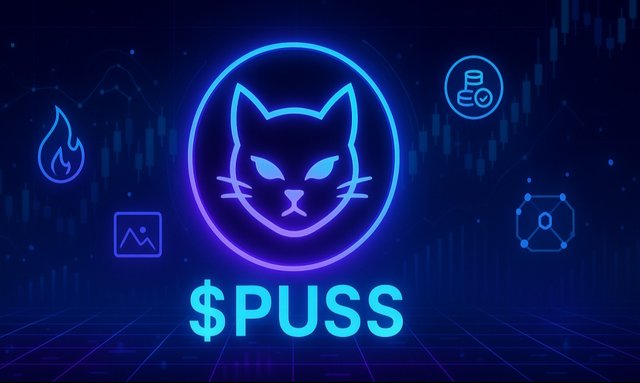Reducing Validator Collusion Of $PUSS COIN: Threats And Solutions
Validator collusion endangers all aspects of fairness and safety of decentralized networks. Collusion of any number of validators in secret allows them to control outcomes and subvert consensus. PUSS Coin must, therefore, institute solid mechanisms that impose transparency and accountability upon the network participants. There must be effective anti-collusion measures to safeguard user trust and the reliability of the system.
Classically, the defense set-up consists of on-chain identity tracking with at least slashing for validator misconduct. Identity tracking allows the community to keep an eye on the behavior of the validators; slashing implements financial penalties for those found guilty of collusion. Both act in concert to hold the undesirables at bay. Hence, a strict and transparent validation layer that discourages coordinated attacks should be established on the PUSS Coin network by applying both.
Encrypted communication of validator messages and decentralized governance for collusion punishment would further enrich protocol integrity. Encrypted channels form a wall of protection from clandestine coordination, while decentralized governance gives token holders an ability to formally accept punishments or measures against collusion. PUSS Coin will be yet further solidified in trust and decentralization with these layers. Together, technical and community-driven systems help maintain fair consensus and reduce the risks of validator manipulation.
- ON-CHAIN IDENTITY TRACKING
Rectifying on-chain identity detection defines a unique cryptographic identity for each validator so that their behavior may be recorded and analyzed transparently. Such visibility discourages any kind of malevolent collaboration among the validators since traceable patterns are created. For PUSS Coin, identity tracking would create a more accountable system and help with the revealing of collusive behavior at an early stage.
Aware that their actions will be seen and traced, collusion is pretty much out of the question. This visibility joins forces with community observation to deter wrongdoing altogether. So measuring collusion is the less desirable course when quickly identifying, flagging, and punishing perpetrators may be the alternative. It's a great layer of self-policing that PUSS Coin can really take advantage of.
Conversely, it is necessary to remember that identity tracking need not infringe on privacy. Pseudonymous-but-verifiable identities allow validators to work without exposing their information in the real world. This compromise preserves privacy while still allowing for tracking. For PUSS Coin, incorporating such tools would ensure the responsible conduct of its validators, while still ascribing to the core values of decentralization and anonymity.
- SLASHING MECHANISMS, AND PUNISHMENTS
The slashing mechanisms deprive validators of part of their stake under the condition of dishonesty and improper conduct in protocol operations. Hence, this economy-oriented threat acts as a harsh deterrent against collusion. Slashing punishments, for coordinated votes, double signings, or failure to follow the consensus process accurately, by PUSS Coin would certainly lessen the risks of collusion.
One of the important benefits of a slashing regime is that it immediately penalizes wrongdoing without human interference. Hence, it grants the offender the right to be treated fairly and equally. In such a system, the financial burden of collusion would weigh heavily against the reward for collusion. It is thus for PUSS Coin to keep the network honest and, hence, self-enforcing.
Obviously, such slashing depends on clear established rules combined with strong detection mechanisms. Also, there should be a scale of appropriateness concerning slashing and its relations to the magnitude of the offense such that it won’t discourage validators from participating. PUSS Coin shall adjust the slashing parameters to strike this much-needed balance and make sure that slashing deters malicious acts without harming any honest validators who inadvertently commit a mistake.
- ENCRYPTED COMMUNICATION CHANNELS
Validators often coordinate collusion threw off-chain communication. Encrypted channels between validators and the network can limit unauthorized or hidden coordination. For PUSS Coin, either controlling or discouraging unauthorized peer-to-peer validator chats could lessen the chances of conspiracies being organized behind the scenes.
Design-wise, encryption would allow only messages related to consensus while blocking all others. Thus, prohibiting free communication would make it extremely difficult for parties to secretly communicate. This, in effect, forces the validators to operate openly through the systems in the blockchain itself. Therefore, PUSS Coin could also place restrictions on validator-to-validator messaging beyond the permitted channels.
Nonetheless, encryption alone cannot stop collusion; it is better paired with monitoring tools. While encrypted channels guarantee secure communication for the protocol, other equally important factors involve logging suspicious patterns of use or outright blocking misuse. For PUSS, encryption would work to exclude external influence but should be within the broader framework to discourage collusion amongst validators.
- DECENTRALIZED GOVERNANCE OVERSIGHT
Decentralized-governance enables token holders to vote on a validator's performance and otherwise consider the possibility of a wrongdoing. If a validator is suspected of colluding, the community would be able to propose taking away or slashing that validator. The power of watchers shifts into the hands of the wider network, thereby stretching PUSS Coin's transparency and responsibility across the holders.
Enabling users to oversee the accountabilities of validators gives them the ability to secure their investments. In the advent of collusion, community members can actually respond immediately in two seconds by voting on corrective action. This brings a lot of people’s attention to a constantly changing system run by a PUSS Coin democracy.
From another angle, decentralized governance makes life more difficult for manipulations to take hold. When powers are distributed amongst a thousand users, you aren't finding an easy validator influence on the outcomes. To build that in PUSS Coin, collusions need to meet an active resistance coming from a broad, enabled user reinforcing the principle of decentralization.
Enforcing validator collusion prevention measures calls for the combination of technical, economic, and governance methods. On-chain identity tracking creates transparency, while slashing imposes economic consequences; encrypted channels can limit private communication, and decentralized oversight enables the community to take independent action. Taken together, these measures can establish a solid, self-regulated validator environment for PUSS Coin, thus ensuring the integrity of the consensus and trust in its ecosystem.



https://x.com/prolee_o/status/1922698995211575380
https://x.com/prolee_o/status/1919861903645442267
https://x.com/prolee_o/status/1919861334272885228
https://x.com/prolee_o/status/1919860637137510845
https://x.com/prolee_o/status/1919860129228329350
We really need to reduce how there is this Volatility affect a whole lot of project actually